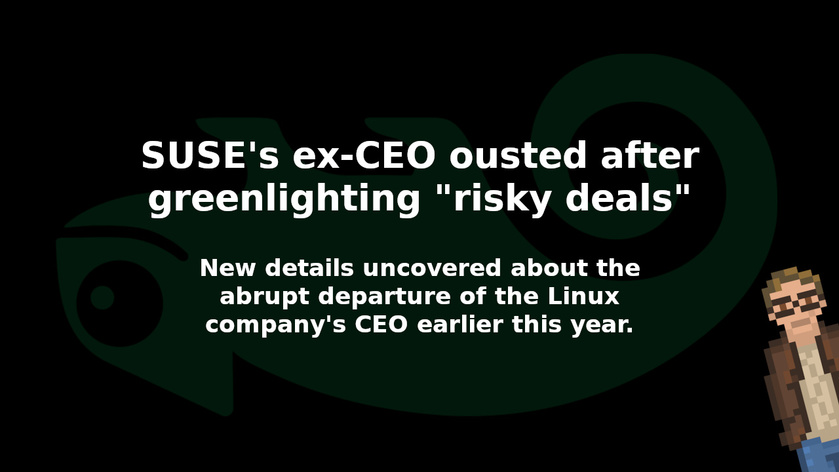On March 22nd of this year, the CEO of SUSE (Melissa di Donato) was unexpectedly announced to no longer be working for the Linux company -- effective that very day.
At the time, it seemed likely (but unconfirmed) that di Donato was fired from her position simply based on her less than stellar performance in the role.
- She oversaw the IPO of SUSE on the German Stock Exchange, which had results which were "not great" at first. Then it got worse.
- As time went on, di Donato oversaw SUSE as it lost close to half of the company's valuation (eventually leading the majority shareholders to seek a de-listing of the company).
- The CEO was so desperate for positive press, that SUSE paid multiple companies to give her fake awards. Seriously. That actually happened.
In the days following di Donato's ousting, confidential sources suggested to The Lunduke Journal that there was more to the story -- that there were significant, non-public reasons for her "immediate departure". More than simply poor performance and cringe-worthy, self-awards.
Thanks to new reporting from Reuters, we might be gaining new insight into what those reasons might be.
Apparently, under di Donato, the SUSE Board felt it was necessary to create a new "Deal Desk" to research and authorize any sizable corporate deal -- to ensure that it was not a "high risk" deal for SUSE. Even going so far as to issue a warning, to shareholders, about such potentially risky existing deals.
When a corporate Board establishes a new system to review "risky" deals made under specific leadership... that is a pretty strong indicator that "risky" deals were being made.
Where there's smoke... there's fire.
From the Reuters article:
"SUSE may enter into high-risk or commercially inappropriate deals if it does not exercise effective control over the Sales organization," it said in the report. The company noted that "'Commercial governance' is a newly identified risk this year" and a heatmap in the report ranked the risk as "possible" and its impact on the business as "high".
A warning to shareholders -- along with assurances the the company would be protected from future risky deals by the new "Deals Desk" -- was issued on January 19th. The SUSE CEO was ousted, without notice, on March 22nd.
So what, exactly, happened in the 63 days between those two events?
It turns out... big, risky deals. And those new deals did not get reviewed by that "Deal Desk".
"According to four documents reviewed by Reuters and two of the people with knowledge of the situation, Di Donato greenlighted the commercial terms of a roughly $1.4 million sale to South African utility Eskom in late January, bypassing the deal desk's scrutiny in order to speed the process, less than two weeks after SUSE told investors the desk would help to improve controls."
Reuters obtained internal SUSE emails that appear to corroborate this:
"On January 30, after commercial terms of the Eskom deal had been agreed, a senior SUSE executive said in an email to other company officials that the terms had not been submitted to the deal desk.
In late February, an executive told colleagues in an email that the sale had not been scrutinized by the deal desk."
Then, a few weeks later, di Donato was -- without warning -- no longer the CEO of SUSE. The departure was so abrupt and unplanned... that SUSE was left without a CEO over a month and a half.
At this point, things appear to be in damage control mode for SUSE -- with shareholders voting in November to de-list the company from the stock exchange and take SUSE private. SUSE no longer being a publicly traded company will significantly reduce the requirements on what sort of information gets reported publicly... including, potentially, about specific, risky deals.
As for Melissa di Donato, she appears to have lawyered up. When Reuters reached out to di Donato for comment... those comments were handled entirely by her attorneys.
What all of this means for the future of the world's longest running Linux company remains to be seen.
The Lunduke Journal has reached out to sources at SUSE for confirmation regarding some details of this report.

















